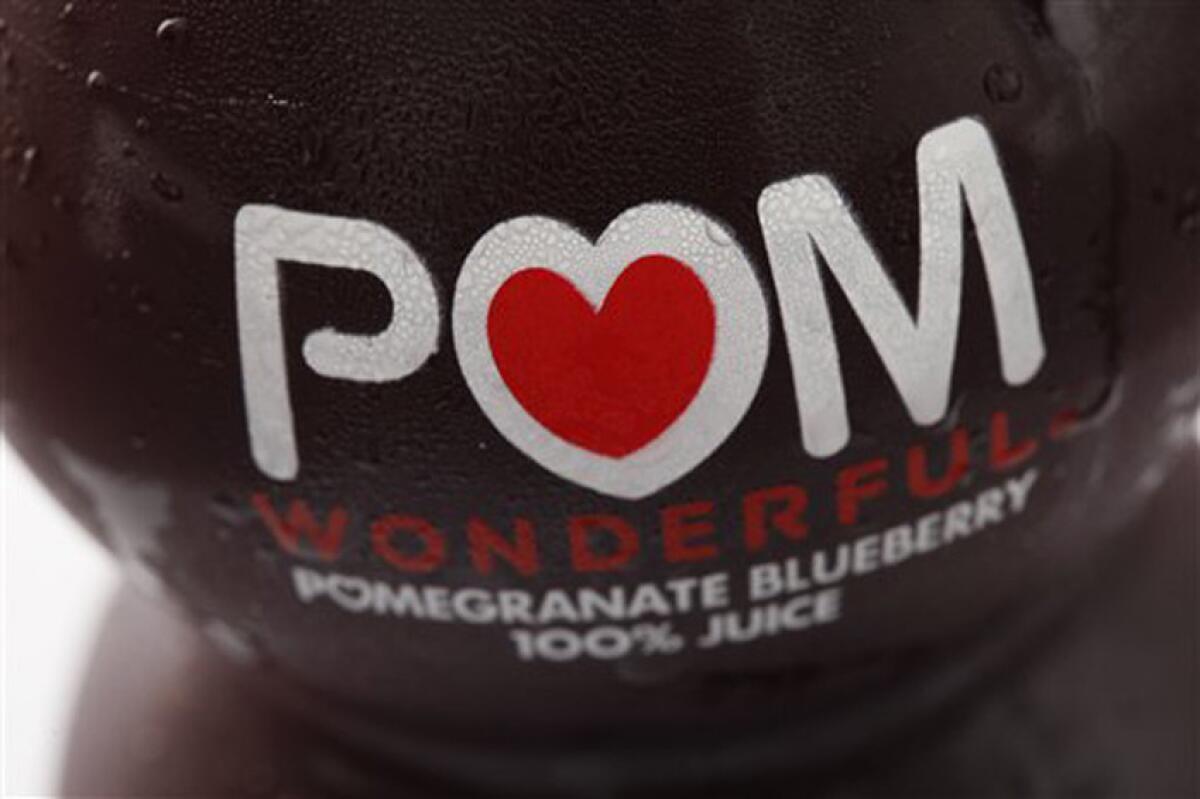Pom Wonderful case not wonderful enough, Supreme Court says

The last chance to make a case for Pom Wonderful’s health claims just got poured down the drain by the nation’s highest court.
The U.S. Supreme Court on Monday declined to review an appeals court decision that health claims in Pom Wonderful advertisements misled consumers.
The move ends a nearly six-year battle launched by the company, part of the agricultural empire of Beverly Hills power couple Lynda and Stewart Resnick, against federal regulators, who questioned the science behind claims that drinking pomegranate juice could “cheat death” by preventing heart disease and prostate cancer.
See more of our top stories on Facebook >>
The lower-court rulings in the case have been cited regularly in cases that attempt to balance the limits of the 1st Amendment’s protection of commercial speech with regulatory responsibilities to protect consumers from misleading advertising claims.
An administrative law judge in 2012 ruled that there was insufficient scientific evidence to back 19 of the company’s implied claims that drinking its pomegranate juice could treat, prevent or reduce the risk of heart disease, prostate cancer and erectile dysfunction.
Studies funded by Pom Wonderful for a reported $35 million were insufficient in part because they did not include at least two human trials with control groups, the judge said in upholding a complaint filed by the Federal Trade Commission.
The Resnicks appealed, saying the FTC misinterpreted the ads, made the substantiation requirements too stringent and restricted their 1st Amendment rights to tell consumers about potential health benefits of pomegranates.
Last year, the U.S. Circuit Court of Appeals for the District of Columbia rejected the company’s arguments, although it scaled back one of the agency’s standards for proof to just one randomized clinically controlled human trial.
SIGN UP for the free California Inc. business newsletter >>
Monday’s decision was the second time that Pom Wonderful appealed to the nation’s highest court. In 2014, the court ruled that it could sue the Coca-Cola Co. over a competing pomegranate drink, marketed under the Minute Maid brand, that was more than 99% apple and grape juice.
A California jury in March rejected Pom Wonderful’s claims of misleading labeling. Minute Maid no longer makes the drink.
Steven Clark, a spokesman for the Wonderful Co., said the FTC questioned only 36 of nearly 600 ads.
“We continue to stand behind our efforts to publicly convey valuable information about the health benefits of POM, as well as the $40 million in peer-reviewed, scientific research we’ve conducted regarding the power of this amazing fresh fruit,” Clark said.
ALSO
Auto sales stay hot in April; Honda and Nissan break records
Johnson & Johnson loses another talcum powder cancer lawsuit
United Airlines pays $37 million to ex-CEO who quit amid a corruption investigation
UPDATES:
May 4, 7:07 p.m.: This post was updated with response from The Wonderful Co.
This post was first published May 3, 2:46 p.m.
More to Read
Inside the business of entertainment
The Wide Shot brings you news, analysis and insights on everything from streaming wars to production — and what it all means for the future.
You may occasionally receive promotional content from the Los Angeles Times.











